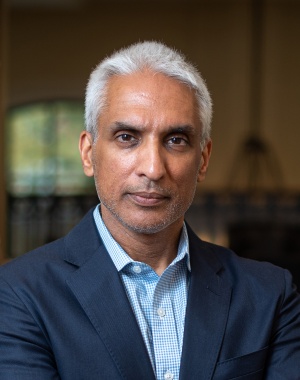
As the Russian military surrounded and began its assault on Ukraine, Melvyn Levitsky, professor of international policy and practice, and Javed Ali, associate professor of practice, lent their expertise to numerous media outlets to break down the situation.
“An invasion would put Russia in the position of an outlaw or rogue country, rather than restore Russia’s position as a world leader,” Levitsky wrote to Al Jazeera.
Levitsky also discussed the history between Ukraine and Russia and how that impacts the current situation.
“For one, Putin has always used foreign policy and some ventures outside of Russia to solidify his own strength inside the country,” Levitsky told Stateside. “There have been some demonstrations around the economy not doing too well, so bringing up Russian nationalism against a potential threat from outside is something that he uses to shore up his strength.”
But, recent changes in the Russian government have made it more difficult for Putin to act without opposition, according to Levitsky.
"It's one of those transition periods where you have a very strong autocratic government but it's not a totalitarian government in terms of controlling everything that goes on,” he told WEYI. “There's private enterprise now that didn't exist in the Soviet period. There's private business. There's dissidence. Well, I wouldn't say dissidence, but opposition.”
Before invading Ukraine, Russia launched cyberattacks targeting Ukrainian banks and government websites. Ali explained how those cyber attacks could be taken to the next level.
“The cyberattacks that happened today are a part of that Russian playbook for cyber operations, but I would say the operations today, at least the ones we know of, are pretty low level,” he told ABC News Radio. “Russia possesses far more destructive cyber capability that they either could launch or perhaps already have. And Russia attacked Ukraine’s tower infrastructure in 2015 and 2016 so they’ve already demonstrated a capability to turn off the power, to turn off the lights there.”
On February 24, Russia invaded Ukraine, launching military assaults across the country.
"I'm not sure what enough is. (Putin) has already violated every international treaty, including the UN charter by invading," Levitsky said on WXYZ. "This has international implications, not just European implications. If he gets away with this and installs a government that is friendly to Russia, a number of countries around the world are going to be worried about what their neighbors' attitudes towards them might be. So it goes beyond U.S. national interests and, of course, European interests. It's a global interest to have this pushed back. Now, the question of what we do and how we do it, with regards to sanctions or other kinds of actions, is a policy matter that will have to be decided by the administration, but the response is going to have to be quite strong."
So far, President Biden has announced strong sanctions that are expected to deeply impact the Russian economy. The sanctions may motivate Russia to carry out cyberattacks in the West, according to Ali.
"I would have to assume that our capabilities are world-class," he told the Detroit Free Press. "That's something that we need to signal somehow to Russia, either openly or quietly, that if you dare strike critical infrastructure targets against the U.S. here, we can respond."
He made a similar comment to ABC News, saying the attacks could escalate to affect utilities, such as gas and electricity.
"Those will be escalatory steps from Russia and that will also likely be integrated with physical military operations all designed to bring cascading effects against Ukraine," he said.
In an op-ed for The Cipher Brief, Ali discussed what he believes to be the most strategic path forward.
“There seems little internal political dissent to Putin’s approach to Ukraine, and already populist anger over the invasion is being suppressed. As a result, Putin seems intent on hurtling Russia on the same path the Soviet Union took in Afghanistan,” he wrote. “Nevertheless, the United States and the international community can work together to ensure the same strategic outcome and raise the costs on Russia’s campaign that will only result in suffering and hardship in Ukraine and across the region should it proceed.”
Read and hear the items featuring Ali and Levitsky:
- As Russia-Ukraine crisis ramps up, Biden faces sanctions dilemma, Al Jazeera, February 23, 2022
- War in Ukraine heightens risk of Russian cyberattacks in US, Michigan experts say, Detroit Free Press, February 24, 2022
- Examining the ramifications of Russia's attack on Ukraine, WXYZ, February 24, 2022
- Former U.S. Ambassador: Opposition in Russia makes war more difficult for Putin, WEYI, February 24, 2022
- Stateside: Thursday, Feb. 24, 2022, Stateside, February 24, 2022
- The Ghosts of Afghanistan Haunt Ukraine, The Cipher Brief, February 25, 2022
-
Shields up: How a possible cyberattack could affect Americans and how to prepare, ABC News, February 25, 2022

